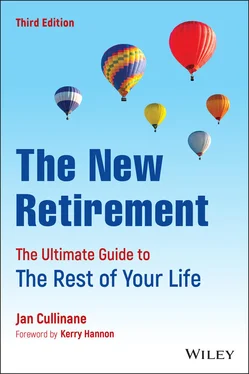Jan Cullinane - The New Retirement
Здесь есть возможность читать онлайн «Jan Cullinane - The New Retirement» — ознакомительный отрывок электронной книги совершенно бесплатно, а после прочтения отрывка купить полную версию. В некоторых случаях можно слушать аудио, скачать через торрент в формате fb2 и присутствует краткое содержание. Жанр: unrecognised, на английском языке. Описание произведения, (предисловие) а так же отзывы посетителей доступны на портале библиотеки ЛибКат.
- Название:The New Retirement
- Автор:
- Жанр:
- Год:неизвестен
- ISBN:нет данных
- Рейтинг книги:5 / 5. Голосов: 1
-
Избранное:Добавить в избранное
- Отзывы:
-
Ваша оценка:
- 100
- 1
- 2
- 3
- 4
- 5
The New Retirement: краткое содержание, описание и аннотация
Предлагаем к чтению аннотацию, описание, краткое содержание или предисловие (зависит от того, что написал сам автор книги «The New Retirement»). Если вы не нашли необходимую информацию о книге — напишите в комментариях, мы постараемся отыскать её.
The New Retirement: The Ultimate Guide to the Rest of Your Life
The New Retirement, 3rd edition,
The New Retirement — читать онлайн ознакомительный отрывок
Ниже представлен текст книги, разбитый по страницам. Система сохранения места последней прочитанной страницы, позволяет с удобством читать онлайн бесплатно книгу «The New Retirement», без необходимости каждый раз заново искать на чём Вы остановились. Поставьте закладку, и сможете в любой момент перейти на страницу, на которой закончили чтение.
Интервал:
Закладка:
There is a disconnect between what many people think will happen and what does happen regarding retirement timing. I refer to it as expectations versus reality. Each year, the Employee Benefit Research Institute (EBRI) publishes a “Retirement Confidence Survey.” The 2020 version, which surveyed more than 2,000 workers and retirees in January 2020 (prepandemic), offers important insights. For example, looking at recent retirees' experiences:
They expected to retire at a median age of 65; they actually retired at a median age of 62.
31% expected to retire at 70; only 6% actually worked until the age of 70.
Only 11% planned to retire before age 60; 33% retired before age 60.
18% planned to retire between 60 and 64; 37% actually did retire during that age range.
48% left the workforce earlier than planned.
The results have been consistent over the years – many of us think we will work longer than we actually do (the EBRI has been doing this annual survey for 30 years). We may get another job or start another career, but it's important to know the reality versus the expectation. Speaking of which … the EBRI looked at this statistic, too, and found that 74% of retirees planned to work for pay in retirement; but only 24% did work for pay in retirement. As Antoine de Saint-Exupéry said, “A goal without a plan is just a wish.”
What did the 2021 EBRI survey of more than 3,000 Americans during the pandemic show? The median expected age for retirement was still 65, and the actual age was still 62; 23% of retirees said the pandemic made them “somewhat or significantly less confident they will have enough to live comfortably throughout retirement.”
Working and Sense of Self
Set aside financial considerations for the moment (they'll be addressed in detail in Chapters 7, 8, and 9). What is your relationship between work and your identity? There are two competing theories. The first, called continuity theory, is the perspective that our levels of self-esteem and life satisfaction stay the same, independent of work. Under this theory, it wouldn't matter if a person worked or not; he or she would maintain the same feelings of well-being. The second perspective, role theory, has two sides. Although role theory considers working to be vital to a person's identity, retirement can improve feelings of well-being if the career/job being left was considered very difficult or stressful; or retirement can cause distress if people feel they have lost a valuable role by not being employed. The effect of leaving your career/job (again, disregarding money) is more a function of how you perceive your employment – does working play a crucial role in your life, is it something to give up with relief, or is it immaterial to how you think about yourself?
Now, think about your “elevator speech” – the blurb you'd give to someone you meet for the first time (called an elevator speech because it takes about the same time as a short elevator ride – 30 to 60 seconds). How would you describe yourself if you had left your job and just met some new neighbors in a new community – would your elevator speech be about your previous career? If so, working may be integral to your self-worth. And that's okay. It may have defined you for many decades. But you will need to find a substitute for it if you do not find/create another job or career. More about that in Chapter 2.
My tip/confession: I've moved seven times, and my husband and I have lived in our present home for more than 14 years. The majority of people in our community are retired and some have started new businesses. Most do not talk about their previous careers, and many had quite illustrious ones. They are present and future-oriented, not reliving their past glory days. I do feel work is integral to me as a person, which is why I still like working, although now it's on my terms and my office is in my house. My husband, on the other hand, had a long career as a tax partner in a major accounting firm, and, although he enjoyed and excelled at his job, he claims he doesn't miss a day of working, and wonders where the day goes.
Why People Decide to Retire
A friend of mine named Jim said you should ask yourself these three questions to decide if you are ready to retire: Do I have enough? Have I had enough? Do I have enough to do? This is simple, clever, and to a large part it reflects what studies have shown as the major reasons why men and women decide to retire:
To do other things
Financial incentives/have enough money to retire
Spouse retired
Poor health
Didn't like working
Didn't get along with boss
Family health issues
Not appreciated
Job terminated
There's no one correct answer to the question “When should I retire?” A 2018 Fidelity survey found that half of Boomer couples disagree about when they should retire, and for Millennials, more than half disagreed what time was/will be the right time. If you are reading this book because you're considering retiring, take the fun and informative “Are You Ready to Launch Your Retirement” quiz at the end of this chapter. And, if you have a spouse or significant other, she/he should also take the quiz … and be sure to have an in-depth discussion about your results.
As you can see from the preceding list, some people retired not because they wanted to, but because they had to. It's important to recognize that it's not always a choice. As the popular idiom succinctly states, “Forewarned is forearmed.”
Retirement Timing for Couples: Same Time or Staggered Times?
If you're part of a couple, should you retire together? Around 50% of married couples in the United States retire within two years of one another. According to a study involving more than 500 working couples in their 50s, 60s, and 70s, they reported greater marital satisfaction if they retired at or around the same time. This is especially true if accumulating additional money is a nonissue, and the couple has shared interests, such as relocating to a new place, travel, getting in shape, or seeing/helping out their children/grandchildren. Interestingly, but perhaps not surprisingly, men who were retired but had working spouses reported the most marital discord. You may have heard the saying “Twice the husband but half the money.” According to Ronald J. Manheimer, founding director of the North Carolina Center for Creative Retirement at the University of North Carolina, women's fears in retirement include losing one's identity, being responsible for their spouses'/significant others' social lives and entertainment, and experiencing a disruption of their established patterns.
However, there are sound reasons for couples to stagger their retirement:
Several years of additional income from the working spouse could make a huge difference in total retirement savings.
The extra income may allow later claiming of Social Security benefits, resulting in an increase in benefits.
Additional years of working by one spouse may shorten the years money needs to be withdrawn from retirement savings.
If there is family medical coverage provided by an employer, this can be a great money-saving move, especially if the other person is under 65 and not eligible for Medicare.
Although “too much togetherness” can be an issue for some couples, having one spouse retire first may help ease the transition to a new lifestyle. Consider creating two separate offices that provide a bit more breathing room if a little space is a desirable thing. Distance can be beneficial sometimes, but Arthur Aron, a relationship researcher at the State University of New York at Stony Brook, has a great suggestion for couples to revitalize their relationship. It's to do something novel that neither of you has done before – and do it together. Examples? Go whitewater rafting, try an Escape Room, take a trip to an exotic place, eat at an ethnic restaurant, help out at a Habitat for Humanity build, take up ballroom dancing. It's found that fresh kinds of activities activate the same systems of the brain that are involved in the rush of romantic love – and cocaine highs! – the dopamine reward system. Aron's research found new experiences among couples boost marital happiness.
Читать дальшеИнтервал:
Закладка:
Похожие книги на «The New Retirement»
Представляем Вашему вниманию похожие книги на «The New Retirement» списком для выбора. Мы отобрали схожую по названию и смыслу литературу в надежде предоставить читателям больше вариантов отыскать новые, интересные, ещё непрочитанные произведения.
Обсуждение, отзывы о книге «The New Retirement» и просто собственные мнения читателей. Оставьте ваши комментарии, напишите, что Вы думаете о произведении, его смысле или главных героях. Укажите что конкретно понравилось, а что нет, и почему Вы так считаете.












